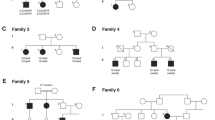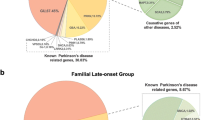Abstract
Mutations in five PARK genes (SNCA, PARKIN, DJ-1, PINK1, and LRRK2) are well-established genetic causes of Parkinson disease (PD). Recently, G2385R substitution in LRRK2 has been determined as a susceptibility allele in Asian PD. The objective of this study is to determine the frequency of mutations in these PARK genes in a Korean early-onset Parkinson disease (EOPD) cohort. The authors sequenced 35 exons in SNCA, PARKIN, DJ-1, PINK1, and LRRK2 in 72 unrelated EOPD (age-at-onset ≤50) recruited from ten movement disorders clinics in South Korea. Gene dosage change of the aforementioned genes was studied using multiple ligation-dependent probe amplification. We found four patients with PARKIN mutations, which were homozygous deletion of exon 4, compound heterozygous deletion of exon 2 and exon 4, heterozygous deletion of exon 4, and heterozygous nonsense mutation (Q40X). Four patients had PINK1 mutations; a compound heterozygous mutation (N367S and K520RfsX522) and three heterozygous mutations (G32R, R279H, and F385L). A missense mutation of SNCA (A53T) was found in a familial PD with autosomal dominant inheritance. Nine patients (12.5%) had heterozygous G2385R polymorphism of LRRK2, whereas none had G2019S mutation. However, no mutations were detected in DJ-1 and UCHL1 in our series. We identified genetic variants in PARKIN, PINK1, LRRK2, and SNCA as a cause or genetic risk factors for PD in 25% of Korean EOPD, and mutation of PARKIN was the most common genetic cause.


Similar content being viewed by others
References
Klein C, Schlossmacher MG (2007) Parkinson disease, 10 years after its genetic revolution: multiple clues to a complex disorder. Neurology 69:2093–2104 doi:10.1212/01.wnl.0000271880.27321.a7
Gwinn-Hardy K (2004) When is ataxia not ataxia? Arch Neurol 61:25–26 doi:10.1001/archneur.61.1.25
Wu YR, Lin HY, Chen CM, Gwinn-Hardy K, Ro LS, Wang YC et al (2004) Genetic testing in spinocerebellar ataxia in Taiwan: expansions of trinucleotide repeats in SCA8 and SCA17 are associated with typical Parkinson’s disease. Clin Genet 65:209–214 doi:10.1111/j.0009-9163.2004.00213.x
Tan EK, Jankovic J (2006) Genetic testing in Parkinson disease: promises and pitfalls. Arch Neurol 63:1232–1237 doi:10.1001/archneur.63.9.1232
Bras J, Guerreiro R, Ribeiro M, Morgadinho A, Januario C, Dias M et al (2008) Analysis of Parkinson disease patients from Portugal for mutations in SNCA, PRKN, PINK1 and LRRK2. BMC Neurol 8:1 doi:10.1186/1471-2377-8-1
Chung EJ, Ki CS, Lee WY, Kim IS, Kim JY (2006) Clinical features and gene analysis in Korean patients with early-onset Parkinson disease. Arch Neurol 63:1170–1174 doi:10.1001/archneur.63.8.1170
Klein C, Djarmati A, Hedrich K, Schafer N, Scaglione C, Marchese R et al (2005) PINK1, Parkin, and DJ-1 mutations in Italian patients with early-onset parkinsonism. Eur J Hum Genet 13:1086–1093 doi:10.1038/sj.ejhg.5201455
Hughes AJ, Daniel SE, Lees AJ (2001) Improved accuracy of clinical diagnosis of Lewy body Parkinson’s disease. Neurology 57:1497–1499
Choi JM, Woo MS, Kim SM, Ma HI, Sung YH, Lee PH et al (2008) Trinucleotide repeats number in SCA2, SCA3 and SCA17 in early-onset Parkinson’s disease. J Korean Neurol Assoc 26:23–27
Djarmati A, Guzvic M, Grunewald A, Lang AE, Pramstaller PP, Simon DK et al (2007) Rapid and reliable detection of exon rearrangements in various movement disorders genes by multiplex ligation-dependent probe amplification. Mov Disord 22:1708–1714 doi:10.1002/mds.21370
Scarciolla O, Brancati F, Valente EM, Ferraris A, De Angelis MV, Valbonesi S et al (2007) Multiplex ligation-dependent probe amplification assay for simultaneous detection of Parkinson’s disease gene rearrangements. Mov Disord 22:2274–2278 doi:10.1002/mds.21532
Ki CS, Stavrou EF, Davanos N, Lee WY, Chung EJ, Kim JY et al (2007) The Ala53Thr mutation in the alpha-synuclein gene in a Korean family with Parkinson disease. Clin Genet 71:471–473 doi:10.1111/j.1399-0004.2007.00781.x
Di Fonzo A, Wu-Chou YH, Lu CS, van Doeselaar M, Simons EJ, Rohe CF et al (2006) A common missense variant in the LRRK2 gene, Gly2385Arg, associated with Parkinson’s disease risk in Taiwan. Neurogenetics 7:133–138 doi:10.1007/s10048-006-0041-5
Funayama M, Li Y, Tomiyama H, Yoshino H, Imamichi Y, Yamamoto M et al (2007) Leucine-rich repeat kinase 2 G2385R variant is a risk factor for Parkinson disease in Asian population. Neuroreport 18:273–275 doi:10.1097/WNR.0b013e32801254b6
Tan EK, Zhao Y, Skipper L, Tan MG, Di Fonzo A, Sun L et al (2007) The LRRK2 Gly2385Arg variant is associated with Parkinson’s disease: genetic and functional evidence. Hum Genet 120:857–863 doi:10.1007/s00439-006-0268-0
Djarmati A, Hedrich K, Svetel M, Schafer N, Juric V, Vukosavic S et al (2004) Detection of Parkin (PARK2) and DJ1 (PARK7) mutations in early-onset Parkinson disease: Parkin mutation frequency depends on ethnic origin of patients. Hum Mutat 23:525 doi:10.1002/humu.9240
Hattori N, Kitada T, Matsumine H, Asakawa S, Yamamura Y, Yoshino H et al (1998) Molecular genetic analysis of a novel Parkin gene in Japanese families with autosomal recessive juvenile parkinsonism: evidence for variable homozygous deletions in the Parkin gene in affected individuals. Ann Neurol 44:935–941 doi:10.1002/ana.410440612
Hedrich K, Eskelson C, Wilmot B, Marder K, Harris J, Garrels J et al (2004) Distribution, type, and origin of Parkin mutations: review and case studies. Mov Disord 19:1146–1157 doi:10.1002/mds.20234
Lucking CB, Durr A, Bonifati V, Vaughan J, De Michele G, Gasser T et al (2000) Association between early-onset Parkinson’s disease and mutations in the parkin gene. N Engl J Med 342:1560–1567 doi:10.1056/NEJM200005253422103
Klein C, Grunewald A, Hedrich K (2006) Early-onset parkinsonism associated with PINK1 mutations: frequency, genotypes, and phenotypes. Neurology 66:1129–1130, author reply 1129–1130 doi:10.1212/01.wnl.0000220157.81513.85
Li Y, Tomiyama H, Sato K, Hatano Y, Yoshino H, Atsumi M et al (2005) Clinicogenetic study of PINK1 mutations in autosomal recessive early-onset parkinsonism. Neurology 64:1955–1957 doi:10.1212/01.WNL.0000164009.36740.4E
Tan EK, Yew K, Chua E, Puvan K, Shen H, Lee E et al (2006) PINK1 mutations in sporadic early-onset Parkinson’s disease. Mov Disord 21:789–793 doi:10.1002/mds.20810
Valente EM, Salvi S, Ialongo T, Marongiu R, Elia AE, Caputo V et al (2004) PINK1 mutations are associated with sporadic early-onset parkinsonism. Ann Neurol 56:336–341 doi:10.1002/ana.20256
Bonifati V, Rohe CF, Breedveld GJ, Fabrizio E, De Mari M, Tassorelli C et al (2005) Early-onset parkinsonism associated with PINK1 mutations: frequency, genotypes, and phenotypes. Neurology 65:87–95 doi:10.1212/01.wnl.0000167546.39375.82
Hedrich K, Hagenah J, Djarmati A, Hiller A, Lohnau T, Lasek K et al (2006) Clinical spectrum of homozygous and heterozygous PINK1 mutations in a large German family with Parkinson disease: role of a single hit? Arch Neurol 63:833–838 doi:10.1001/archneur.63.6.833
Kay DM, Moran D, Moses L, Poorkaj P, Zabetian CP, Nutt J et al (2007) Heterozygous parkin point mutations are as common in control subjects as in Parkinson’s patients. Ann Neurol 61:47–54 doi:10.1002/ana.21039
Hedrich K, Kann M, Lanthaler AJ, Dalski A, Eskelson C, Landt O et al (2001) The importance of gene dosage studies: mutational analysis of the parkin gene in early-onset parkinsonism. Hum Mol Genet 10:1649–1656 doi:10.1093/hmg/10.16.1649
Cho JW, Kim SY, Park SS, Kim HJ, Ahn TB, Kim JM et al (2007) The G2019S LRRK2 mutation is rare in Korean patients with Parkinson’s disease. Can J Neurol Sci 34:53–55
Funayama M, Hasegawa K, Ohta E, Kawashima N, Komiyama M, Kowa H et al (2005) An LRRK2 mutation as a cause for the parkinsonism in the original PARK8 family. Ann Neurol 57:918–921 doi:10.1002/ana.20484
Tan EK, Shen H, Tan LC, Farrer M, Yew K, Chua E et al (2005) The G2019S LRRK2 mutation is uncommon in an Asian cohort of Parkinson’s disease patients. Neurosci Lett 384:327–329 doi:10.1016/j.neulet.2005.04.103
Acknowledgement
This work was supported by the Korea Research Foundation Grant funded by the Korean Government (MOEHRD) (KRF-2005-042-E00123).
Author information
Authors and Affiliations
Corresponding author
Additional information
Jung Mi Choi and Myoung Soo Woo equally contributed to this work.
Rights and permissions
About this article
Cite this article
Choi, J.M., Woo, M.S., Ma, HI. et al. Analysis of PARK genes in a Korean cohort of early-onset Parkinson disease. Neurogenetics 9, 263–269 (2008). https://doi.org/10.1007/s10048-008-0138-0
Received:
Accepted:
Published:
Issue Date:
DOI: https://doi.org/10.1007/s10048-008-0138-0




